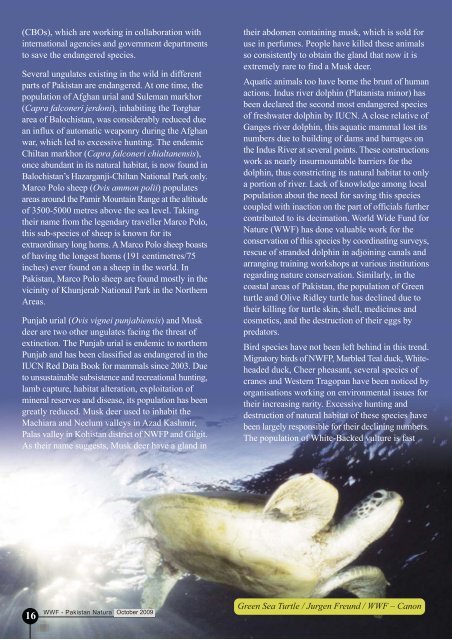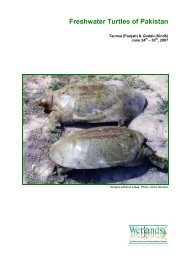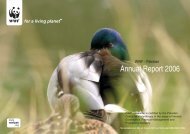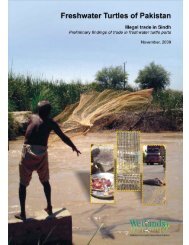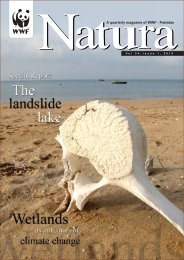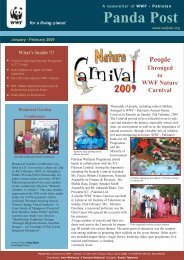Nasir Iqbal Malik - WWF - Pakistan
Nasir Iqbal Malik - WWF - Pakistan
Nasir Iqbal Malik - WWF - Pakistan
- TAGS
- nasir
- iqbal
- malik
- pakistan
- wwfpak.org
You also want an ePaper? Increase the reach of your titles
YUMPU automatically turns print PDFs into web optimized ePapers that Google loves.
(CBOs), which are working in collaboration with<br />
international agencies and government departments<br />
to save the endangered species.<br />
Several ungulates existing in the wild in different<br />
parts of <strong>Pakistan</strong> are endangered. At one time, the<br />
population of Afghan urial and Suleman markhor<br />
(Capra falconeri jerdoni), inhabiting the Torghar<br />
area of Balochistan, was considerably reduced due<br />
an influx of automatic weaponry during the Afghan<br />
war, which led to excessive hunting. The endemic<br />
Chiltan markhor (Capra falconeri chialtanensis),<br />
once abundant in its natural habitat, is now found in<br />
Balochistan’s Hazarganji-Chiltan National Park only.<br />
Marco Polo sheep (Ovis ammon polii) populates<br />
areas around the Pamir Mountain Range at the altitude<br />
of 3500-5000 metres above the sea level. Taking<br />
their name from the legendary traveller Marco Polo,<br />
this sub-species of sheep is known for its<br />
extraordinary long horns. A Marco Polo sheep boasts<br />
of having the longest horns (191 centimetres/75<br />
inches) ever found on a sheep in the world. In<br />
<strong>Pakistan</strong>, Marco Polo sheep are found mostly in the<br />
vicinity of Khunjerab National Park in the Northern<br />
Areas.<br />
Punjab urial (Ovis vignei punjabiensis) and Musk<br />
deer are two other ungulates facing the threat of<br />
extinction. The Punjab urial is endemic to northern<br />
Punjab and has been classified as endangered in the<br />
IUCN Red Data Book for mammals since 2003. Due<br />
to unsustainable subsistence and recreational hunting,<br />
lamb capture, habitat alteration, exploitation of<br />
mineral reserves and disease, its population has been<br />
greatly reduced. Musk deer used to inhabit the<br />
Machiara and Neelum valleys in Azad Kashmir,<br />
Palas valley in Kohistan district of NWFP and Gilgit.<br />
As their name suggests, Musk deer have a gland in<br />
16<br />
<strong>WWF</strong> - <strong>Pakistan</strong> Natura<br />
October 2009<br />
their abdomen containing musk, which is sold for<br />
use in perfumes. People have killed these animals<br />
so consistently to obtain the gland that now it is<br />
extremely rare to find a Musk deer.<br />
Aquatic animals too have borne the brunt of human<br />
actions. Indus river dolphin (Platanista minor) has<br />
been declared the second most endangered species<br />
of freshwater dolphin by IUCN. A close relative of<br />
Ganges river dolphin, this aquatic mammal lost its<br />
numbers due to building of dams and barrages on<br />
the Indus River at several points. These constructions<br />
work as nearly insurmountable barriers for the<br />
dolphin, thus constricting its natural habitat to only<br />
a portion of river. Lack of knowledge among local<br />
population about the need for saving this species<br />
coupled with inaction on the part of officials further<br />
contributed to its decimation. World Wide Fund for<br />
Nature (<strong>WWF</strong>) has done valuable work for the<br />
conservation of this species by coordinating surveys,<br />
rescue of stranded dolphin in adjoining canals and<br />
arranging training workshops at various institutions<br />
regarding nature conservation. Similarly, in the<br />
coastal areas of <strong>Pakistan</strong>, the population of Green<br />
turtle and Olive Ridley turtle has declined due to<br />
their killing for turtle skin, shell, medicines and<br />
cosmetics, and the destruction of their eggs by<br />
predators.<br />
Bird species have not been left behind in this trend.<br />
Migratory birds of NWFP, Marbled Teal duck, Whiteheaded<br />
duck, Cheer pheasant, several species of<br />
cranes and Western Tragopan have been noticed by<br />
organisations working on environmental issues for<br />
their increasing rarity. Excessive hunting and<br />
destruction of natural habitat of these species have<br />
been largely responsible for their declining numbers.<br />
The population of White-Backed vulture is fast<br />
Green Sea Turtle / Jurgen Freund / <strong>WWF</strong> – Canon


